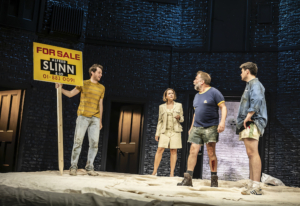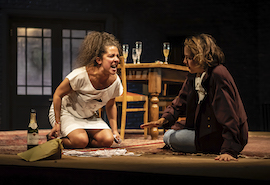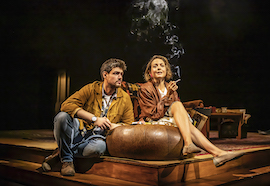Guest Blog: Michael Coveney On Stephen Jeffreys' VALUED FRIENDS

When the late Stephen Jeffreys' award-winning comedy Valued Friends opened at the Hampstead Theatre in 1989, one or two critics, suspicious of its brilliant structure and well-crafted narrative, declared it "safe" and "old-fashioned" - by which they meant that the London fringe, or alternative, theatre had gone soft.
For good measure, one or two of these same critics felt that in evoking, however accurately, a certain time in the mid-1980s, the moment at which a shared home becomes a joint investment, the play arrived anyway with "dated" or "yesterday's news" stamped all over it.
Of course Jeffreys, who went on to become one of the most important figures in contemporary drama at the Royal Court, where he was literary manager in the 1990s, was writing about a specific period in the immediate past, isolating a problem of lifestyle - both economic and social - as the property market boomed, rents soared, and it became impossible to live in a room in London on a basic salary.
As Michael Fentiman's lucid and entertaining revival clearly demonstrates, the scene where this alarming news takes hold, when the landlord offers the four friends £30k for instant vacant possession, is not just a pivotal reveal in the course of a yuppie comedy, but an alarm call for a whole generation, just as Lophakin's brutal acquisition of the cherry orchard for development in Chekhov's play shakes up the pre-revolutionary generation of landed gentry and farmers.
No one, I think, goes around complaining that The Cherry Orchard is dated. And I don't presume that Jeffreys had this great prophetic masterpiece in mind when he wrote his play. But, 30 years on, it has acquired a similar sort of reverberation, as the four friends are torn apart in the process of buying the flat, buying out each other, destabilising their friendship and moving into a brave new world of shiny furniture, stylish houseplants and home-delivered, pre-cooked meals (this latter detail comes with a delicious theatrical twist).

There is also, in this Rose Theatre revival, a completely recognisable and contemporary sense of melancholy as the world moves on and we leave our younger, possibly better, selves behind.
Whether or not to bring children into such a world is a key theme in the relationship between the embryonic Thatcherite Marion and the pop music journalist Paul. They are drifting apart, though sharing the same bed. Their time together is marked by Paul's obsession with the 1960s group The Searchers ("Needles and Pins" prickle our skins throughout the show) and a new wave breaks at a Style Council concert.
Like some other plays of the 1980s, especially those of Doug Lucie, Jeffreys is very good at using cultural signifiers to indicate the shifting tectonic plates of emotional commitment and spiritual innocence or purity. And like all good comedies, Valued Friends, we now see, really does carry a strong emotional clout. I had also forgotten the role of the builder, Stewart, a onetime DJ on the pirate Radio Caroline, who attracts women when he does up their properties but loses them when he starts a new job. He's a rogue philosopher straight out of Bernard Shaw.
And this was Jeffreys' first significant play. How did he know so much so young? Well, he had determined to be a writer at the age of 12 and graduated in English literature at Southampton University in 1972 (the valued friends, too, are Southampton graduates, so Jeffreys is here writing about people he knew) and had been around for some time, starting a small company in Cumbria, working as resident writer at the Brewery Arts Centre, and with Paines Plough.
He was also heavily involved with the National Student Drama Festival. One of his unusual qualities was an ability to be as encouraging to other writers as he was loyal to his own talent. He had served a rich apprenticeship (he'd even worked briefly as an electrician at the Royal Court in 1975) and, as David Edgar said in the wake of his death in September 2017, he always argued persuasively that understanding the traditional craft of playmaking enabled you to experiment.

Another fine playwright who emerged at the Royal Court on his watch, Joe Penhall, said that "an entire generation of playwrights was bonded to him, a symbol of selflessness in a sometimes narcissistic profession". Other significant peer writers - Simon Stephens, Winsome Pinnock, Tanika Gupta and Roy Williams - concurred. The Royal Court's artistic director at the time, Stephen Daldry, said that "what he doesn't know about playwriting isn't worth knowing".
It's this generosity of spirit allied to strict discipline of craftsmanship that made him such a good writer. In the year after Valued Friends, he wrote an ebullient satire, The Clink, an Elizabethan low-life romp with sidelights on Thatcher's Britain, and this ability to give a meaningful contemporary slant on Elizabethan, and indeed Restoration, drama, led to a brilliant reclamation of a forgotten 16th-century comedy, A Jovial Crew by Richard Brome, for the RSC in 1992.
And then, of course, on to probably his best play, The Libertine (1994), about the decadent Restoration poet John Wilmot, Earl of Rochester; this was staged at the Royal Court by director Max Stafford-Clark's Out of Joint touring company in tandem with George Etherege's The Man of Mode, whose leading character, Dorimant, is based on Rochester.
Jeffreys' sure-footed editing of Etherege, and indeed Ben Jonson - he overhauled, very effectively, The Alchemist for the RSC in 2016 - makes you wonder how much more he could have done for our increasingly cold-shouldered classical legacy, certainly more than seems forthcoming these days from The National Theatre or even the RSC themselves.
Three years after Valued Friends, Jeffreys returned to his immediate personal background in A Going Concern, also produced at Hampstead Theatre. This was loosely based on his father's family business of making billiard tables, but he threw his balls in the air to write about the wrangles over three generations and the cultural shift of expanding into the American pool table market.
Here, no less than in Alan Ayckbourn's A Small Family Business, was a dramatic metaphor of social evolution, a double-edged comedy of progress and decline. And Valued Friends, we now see, is the start of it. It's an old adage, virtually a cliché, to say that, in the first place, you should write what you know. Stephen Jeffreys is a superb example of doing that while expanding his compass and vision into the society beyond, and the fundamental sadness and beauty of human existence.
Valued Friends at Rose Theatre Kingston until 12 October
Photo credit: Pamela Raith
Comments
Videos

